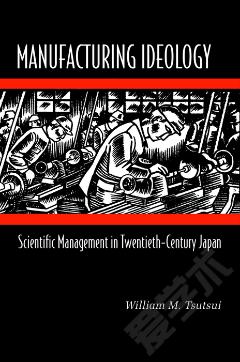Manufacturing Ideology —— Scientific Management in Twentieth-Century Japan
----- 制造业思想:二十世纪日本的科学管理
Japanese industry is the envy of the world for its efficient and humane management practices, yet the origins and implications of "Japanese-style" management are poorly understood. This book claims that Japanese stategies are not particularly novel, or even especially Japanese. The book traces the roots of these practices to scientific management, or Taylorism, an American concept that arrived in Japan at the turn of the 20th century. This imported model was then transformed in Japan's industrial workshops. This study charts Taylorism's Japanese incarnation from the 1920s to the Depression era, wartime mobilization and postwar productivity drives. Taylorism became more than a management tool, as it spread into economic growth, social policy and political authority in modern Japan. This historical and comparative perspective reveals the centrality of Japanese Taylorism to ongoing discussions of Japan's government-industry relations and the evolution of Fordist mass production.
{{comment.content}}








 京公网安备 11010802027623号
京公网安备 11010802027623号